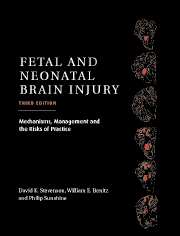Book contents
- Frontmatter
- Contents
- List of contributors
- Foreword
- Preface
- Part I Epidemiology, Pathophysiology, and Pathogenesis of Fetal and Neonatal Brain Injury
- Part II Pregnancy, Labor, and Delivery Complications Causing Brain Injury
- Part III Diagnosis of the Infant with Asphyxia
- Part IV Specific Conditions Associated with Fetal and Neonatal Brain Injury
- Part V Management of the Depressed or Neurologically Dysfunctional Neonate
- Part VI Assessing the Outcome of the Asphyxiated Infant
- 40 Assessment of preterm infants' neurobehavioral functioning: reliability, validity, normative data, and prediction to age two
- 41 Long-term follow-up of term infants with perinatal asphyxia
- 42 Appropriateness of intensive care application
- 43 Medicolegal issues in perinatal brain injury
- Index
- Plate section
41 - Long-term follow-up of term infants with perinatal asphyxia
from Part VI - Assessing the Outcome of the Asphyxiated Infant
Published online by Cambridge University Press: 10 November 2010
- Frontmatter
- Contents
- List of contributors
- Foreword
- Preface
- Part I Epidemiology, Pathophysiology, and Pathogenesis of Fetal and Neonatal Brain Injury
- Part II Pregnancy, Labor, and Delivery Complications Causing Brain Injury
- Part III Diagnosis of the Infant with Asphyxia
- Part IV Specific Conditions Associated with Fetal and Neonatal Brain Injury
- Part V Management of the Depressed or Neurologically Dysfunctional Neonate
- Part VI Assessing the Outcome of the Asphyxiated Infant
- 40 Assessment of preterm infants' neurobehavioral functioning: reliability, validity, normative data, and prediction to age two
- 41 Long-term follow-up of term infants with perinatal asphyxia
- 42 Appropriateness of intensive care application
- 43 Medicolegal issues in perinatal brain injury
- Index
- Plate section
Summary
Introduction
Follow-up, longitudinal, and cohort studies play a unique role in the prediction of outcomes such as mortality, disability, growth, and child development within the science of pediatric epidemiology. These studies are useful to generate and test hypotheses. To assess “the outcomes approach” in the study of perinatal asphyxia, the role, advantages, and disadvantages of long-term follow-up should be reviewed.
Central to long-term follow-up studies is the prospective definition of the reference population, tracking of individuals over time, and the consistent use of specific measurement tools to determine outcome. Longitudinal studies in the narrow sense measure individuals at several well-defined occasions and usually every individual is measured on each occasion. These studies are particularly important in demonstrating the accumulation of risk over time and in identifying latent effects. They rely on variations that occur in risk factors, hence the degree of association can be quantified for different exposure levels. They also clarify the direction in which the associations are likely to operate, although they cannot provide “proof” of causality. A recent comparison of randomized controlled trials and observational (cohort and case-control) studies affirms the value of the latter. Uniformity of outcome measures, with a focus on health and functional status, add to the value of long-term follow-up of at-risk neonates. Overall, longitudinal studies are important in identifying long-term sequelae of physical disability, as well as intellectual and educational outcome, and hence, they assist in providing information that can be used for the prediction of childhood developmental disorders.
- Type
- Chapter
- Information
- Fetal and Neonatal Brain InjuryMechanisms, Management and the Risks of Practice, pp. 829 - 858Publisher: Cambridge University PressPrint publication year: 2003
- 7
- Cited by



